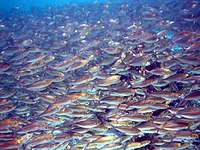Portal:Ecology
| |
|
|
Ecology
|
|
Ecology (from Ancient Greek οἶκος (oîkos) 'house', and -λογία (-logía) 'study of') is the natural science of the relationships among living organisms, including humans, and their physical environment. Ecology considers organisms at the individual, population, community, ecosystem, and biosphere levels. Ecology overlaps with the closely related sciences of biogeography, evolutionary biology, genetics, ethology, and natural history. Ecology is a branch of biology, and is the study of abundance, biomass, and distribution of organisms in the context of the environment. It encompasses life processes, interactions, and adaptations; movement of materials and energy through living communities; successional development of ecosystems; cooperation, competition, and predation within and between species; and patterns of biodiversity and its effect on ecosystem processes. Ecology has practical applications in conservation biology, wetland management, natural resource management (agroecology, agriculture, forestry, agroforestry, fisheries, mining, tourism), urban planning (urban ecology), community health, economics, basic and applied science, and human social interaction (human ecology). The word ecology (German: Ökologie) was coined in 1866 by the German scientist Ernst Haeckel. The science of ecology as we know it today began with a group of American botanists in the 1890s. Evolutionary concepts relating to adaptation and natural selection are cornerstones of modern ecological theory. Ecosystems are dynamically interacting systems of organisms, the communities they make up, and the non-living (abiotic) components of their environment. Ecosystem processes, such as primary production, nutrient cycling, and niche construction, regulate the flux of energy and matter through an environment. Ecosystems have biophysical feedback mechanisms that moderate processes acting on living (biotic) and abiotic components of the planet. Ecosystems sustain life-supporting functions and provide ecosystem services like biomass production (food, fuel, fiber, and medicine), the regulation of climate, global biogeochemical cycles, water filtration, soil formation, erosion control, flood protection, and many other natural features of scientific, historical, economic, or intrinsic value. (Full article...) Selected article -Acclimatisation societies were voluntary associations, founded in the 19th and 20th centuries, that encouraged the introduction of non-native species in various places around the world, in the hope that they would acclimatise and adapt to their new environments. The societies formed during the colonial era, when Europeans began to settle in numbers in unfamiliar locations. One motivation for the activities of the acclimatisation societies was that introducing new species of plants and animals (mainly from Europe) would enrich the flora and fauna of target regions. The movement also sought to establish plants and animals that were familiar to Europeans, while also bringing exotic and useful foreign plants and animals to centres of European settlement. It is now widely understood that introducing species to foreign environments is often harmful to native species and to their ecosystems. For example, in Australia the environment was seriously harmed by overgrazing by rabbits. In North America house sparrows displaced and killed native birds. In New Zealand, introduced mammals such as possums and cats became threats to indigenous plants, birds and lizards. Around the world, salamander populations are threatened by introduced fungal infections. Consequently, the deliberate introduction of new species is now illegal in some countries. (Full article...)Selected image - Credit: Composite image created by User:Medeis General imagesThe following are images from various ecology-related articles on Wikipedia.
Related WikiProjectsThings you can do
Entries here consist of Good and Featured articles, which meet a core set of high editorial standards.
 The Leopold Report, officially known as Wildlife Management in the National Parks, is a 1963 paper composed of a series of ecosystem management recommendations that were presented by the Special Advisory Board on Wildlife Management to United States Secretary of the Interior Stewart Udall. Named for its chairman and principal author, zoologist and conservationist A. Starker Leopold, the report proved influential for future preservation mandates. After several years of public controversy regarding the forced reduction of the elk population in Yellowstone National Park, Udall appointed an advisory board to collect scientific data to inform future wildlife management of the national parks. The committee observed that culling programs at other national parks had been ineffective, and recommended different management of Yellowstone's elk population. In addressing the goals, policies, and methods of managing wildlife in the parks, the report suggested that in addition to protection, wildlife populations should be managed and regulated to prevent habitat degradation. Touching upon predator control, fire ecology, and other issues, the report suggested that the National Park Service (NPS) hire scientists to manage the parks using current scientific research. (Full article...)Selected biography - Ann Fowler Rhoads (born 1938) is an American botanist who worked as a plant pathologist at Morris Arboretum for 36 years, retiring in 2013. She is the co-founder (with Timothy A. Block) of the Pennsylvania Flora Project of Morris Arboretum. In addition, Rhoads is a former Adjunct Professor at the University of Pennsylvania and a former Research Associate at the Academy of Natural Sciences. Rhoads has written and edited 6 books. Her most important work is The Plants of Pennsylvania: An Illustrated Manual, which she coauthored with Timothy Block. It has been called the "Bible of our state's plant life". It is particularly significant “because most states simply don’t have such a comprehensive work on regional flora. Relevant to plant life found in much of the Northeast, the book has also been requested in neighboring states." A second edition was published in 2007. (Full article...)Did you know (auto-generated)
Selected quote -
Ecology news
Additional News Highlights
Selected publication -Oikos is an international scientific journal published monthly by the Nordic Society Oikos in the field of ecology. It was previously known as Acta Oecologica Scandinavica. Oikos is published in collaboration with Ecography, Lindbergia, the Journal of Avian Biology, and with the monograph series Ecological Bulletins. (Full article...) Related portalsMore did you know -Related articlesAssociated WikimediaThe following Wikimedia Foundation sister projects provide more on this subject:
Web resources
Discover Wikipedia using portals |















































